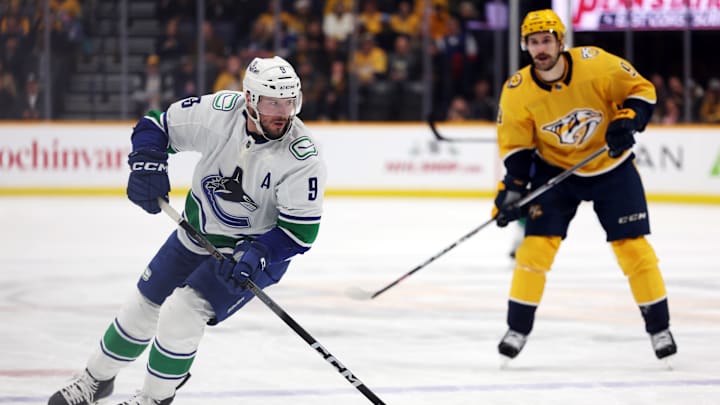With the Vancouver Canucks set to take on the Nashville Predators in the first round of the 2024 Stanley Cup Playoffs, here’s a look at how the two teams match up, player to player.
These comparisons have less to do with position and more to do with role and production. For example, a centreman and a left winger might be the closest comparables to each other — not because of position but because of role and production. That being said, there are no perfect comparisons because these are ultimately different players.
The winner of each matchup will contribute a point to his team, resulting in the declaration of the “on paper” champion for this series.
Any questions? Alright, let’s get started.
Forwards
JT Miller: 81 GP, 37 G, 66 A, 103 P, +32
Filip Forsberg: 82 GP, 48 G, 46 A, 94 P, +16
This season was a revelation for Filip Forsberg, who not only set a personal high for goals, but set the franchise record as well. He also fell two points short of Roman Josi’s single-season points record. Forsberg was also responsible in his own end, although he’s far from being classified as a two-way forward because he doesn’t kill penalties or play in key defensive situations.
JT Miller also set personal records for goals and points this year, finally eclipsing the 100-point mark that has eluded him for so long. Unlike Forsberg, however, Miller can be classified as a two-way forward — and a good one at that. He’s also the type of player who is built for the playoffs. He’s tough to play against in every zone and he’s a physical force. If the Predators are going to contend against the Canucks, they’ll have to find a way to counter Miller’s efforts.
Both players are exceptional offensively, but because of Miller’s defensive ability as well as his outright tenacity, he gets a point here.
Elias Pettersson: 82 GP, 34 G, 55 A, 89 P, +20
Ryan O’Reilly: 82 GP, 26 G, 43 A, 69 P, +6
Contrary to what his 2022-23 play showed, Ryan O’Reilly has still got it. After signing a four-year deal with the Predators in the off-season, the Stanley Cup champion played as well as the team could have hoped for.
If Hart Trophy voting had taken place at the all-star break, Elias Pettersson might have been a finalist. His play since then, however, has taken him out of the running for any major trophy. He’s scored just one goal in his last 13 games and has looked slow and prone to error. If the Canucks are to have any success in the playoffs, Pettersson has to get back to his regular self.
As much as O’Reilly has proven himself this year, Pettersson is still one of the best centremen in the world. The point goes to Pettersson, although it comes with a major asterisk.
Brock Boeser: 81 GP, 40 G, 33 A, 73 P, +23
Gustav Nyquist: 81 GP, 23 G, 52 A, 75 P, +7
Remember that Gustav Nyquist guy? The one that’s played middle-six roles with a bunch of different teams over the last 12 years? He’s kind of an elite scorer now. Previous to this season, Nyquist’s best point totals were in the low 50s. He potted 75 this year.
Going along with the theme of career highs, Brock Boeser, who had previously never had a 30-goal season, scored 40 goals in 2023-24. Like Nyquist, his best point totals started with fives, but this year it starts with a seven.
Boeser has been excellent all year, but lots of his goals have come in situations where the team was already leading by a significant margin. He also doesn’t drive play the way a lot of 40-goal scorers do. Nyquist, on the other hand, has been a game breaker and he’s earned the right to be recognized as such. Nyquist gets the point here.
